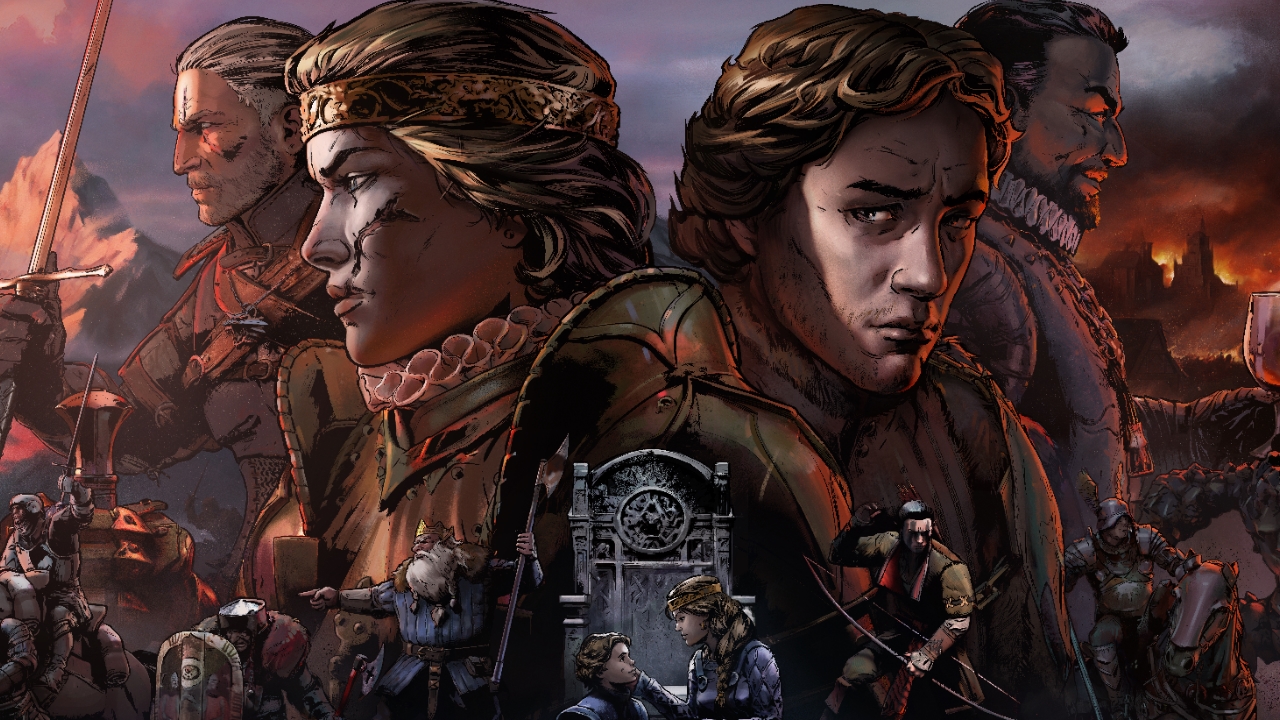GamesRadar+ Verdict
An amazing marriage of world-class storytelling and strategic card gaming, Thronebreaker: The Witcher Tales is a fantastic RPG in its own right.
Pros
- +
Best-in-class storytelling
- +
Gorgeous aesthetics
- +
Satisfying card battles
Cons
- -
A few typos here and there
- -
Having to live with decisions you regret
Why you can trust GamesRadar+
Beheaded. Such was the end for one of my former party members in Thronebreaker: The Witcher Tales, after a judgment call I made in the hopes of meting out justice effectively sentenced him to death. And though this grisly execution was never shown on-screen - only mentioned in a single, simple sentence - it hit me harder than any other video game death in recent memory. All this from a card game, no less. As a full-fledged single-player RPG made as the companion to CD Projekt Red's Gwent (itself the standalone version of The Witcher 3's deep collectible card game), Thronebreaker has set the new gold standard for how the genre can elevate itself far beyond the basics of building decks and flopping cards onto a virtual board. Imagine if Hearthstone's solo Adventures and Dragon Age: Inquisition had a kid, which had to then fend for itself in the same harsh, monster-filled world as Geralt of Rivia. That's Thronebreaker.
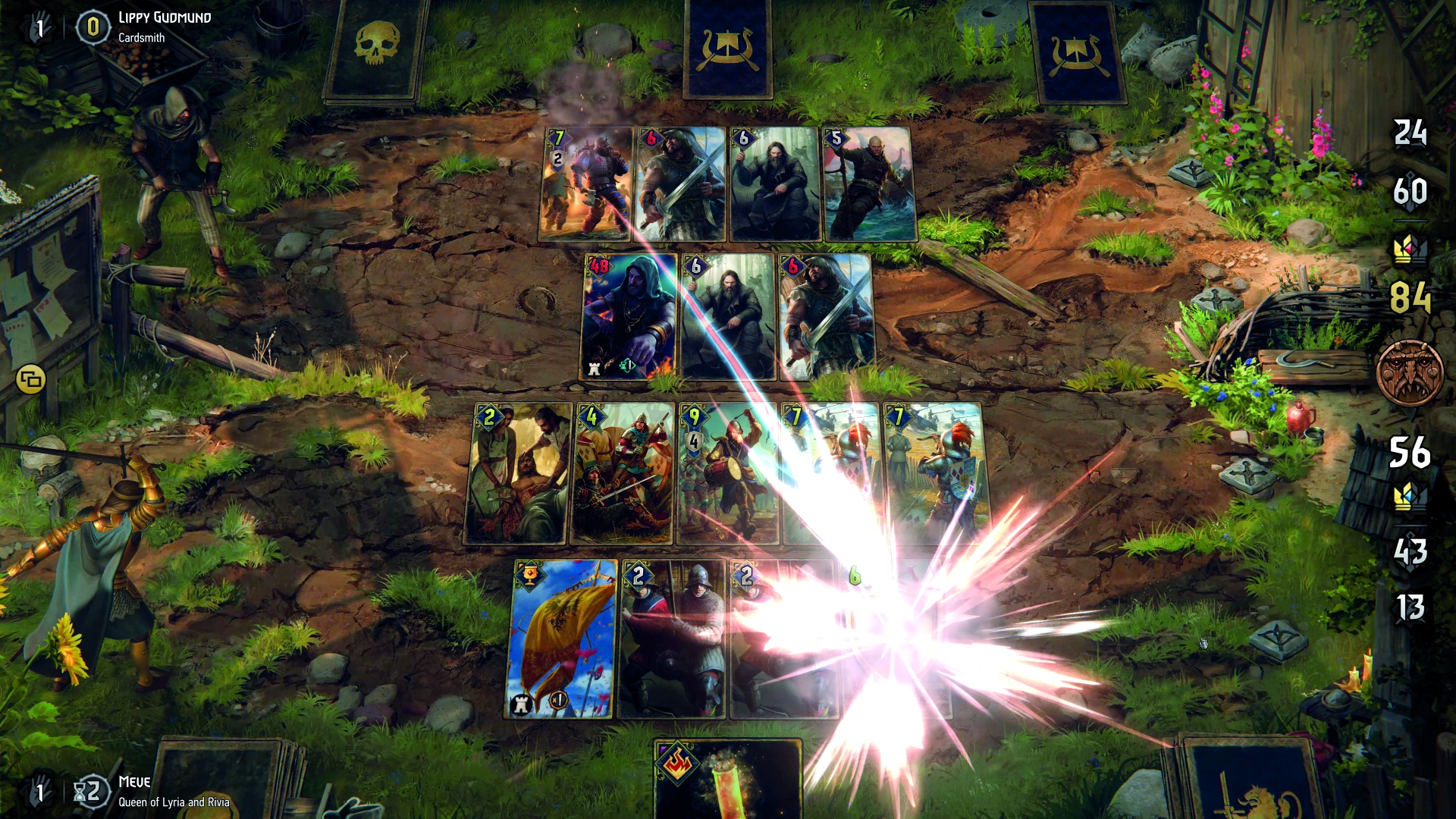
But Geralt isn't the star of Thronebreaker - that honor belongs to Meve, the sword-savvy queen of Lyria and Rivia who's only been mentioned here and there in Witcher games past. She's the kind of regal hero anyone can love: noble, stubborn, never suffering fools but still exhibiting a sharp sense of humor. It is a time of high fantasy war: Meve's kingdoms in the North are being overrun by the ruthless forces of the Nilfgaardians, and she's taken it upon herself to fight back against her people's oppressors despite her army being hopelessly outnumbered. You start with only your trusted commander Reynard (not to be confused with Hearthstone personality Reynad) at your side - but over the course of a sizable campaign lasting 30+ hours, you'll amass a party of quirky, lovable characters who rival any BioWare cast and will constantly be chiming in exactly when you want to hear their take on something.
Thronebreaker echoes the gut-wrenching decisions and impactful losses of The Banner Saga, chronicling a Lyrian army that's increasingly beleaguered by overwhelming odds, while Meve's closest confidants offer up conflicting counsel regarding the tough calls she has to make on a regular basis. Your options are never explicitly labeled as morally good or bad, or with clear outcomes for those involved; the only certain repercussions pertain to the resources you collect around the isometric overworld, used to upgrade your troops and craft new cards, and a simple morale scale that can strengthen or weaken your forces during the next fight. Oftentimes, judgments you make will come back to haunt you, or result in some unforeseen boon that helps make you feel like you did the right thing. Thronebreaker is constantly autosaving after each and every incident, so you'll need to live with your decisions no matter how much you regret them. For instance, that time I unwittingly turned down a charismatic party member who could've - should've, even - been with me for the entire game.
Heavy is the head that wears the crown
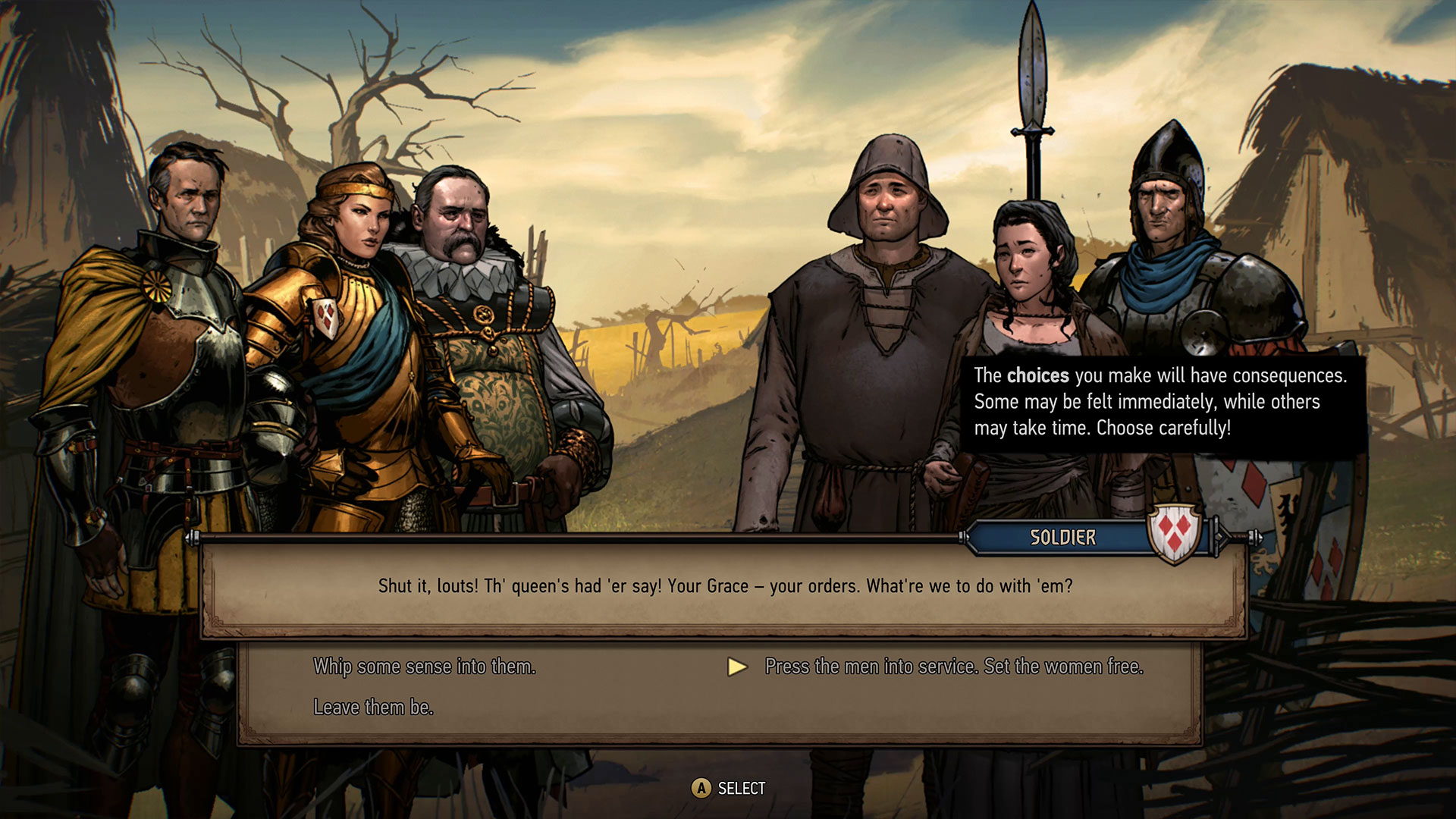
The wide array of medieval problems Meve needs to solve as she explores the varied realms will likely feel familiar - nobles quarreling over land, thieves with a righteous cause, civilians forced to commits crimes in desperation, and so on. But you'll be listening in rapt attention to how these events unfold, as each is grippingly told in ways you're simply not used to. I've encountered plenty of high fantasy racism in my time, but Thronebreaker is the first game to really make me think deeply about my own biases and those of my council. You'll find yourself staring at some decisions for what feels like ages, unsure of what will ultimately sit right with you. It's telling that Thronebreaker's version of Telltale's "They will remember that" recording of major decisions is "You've chosen one evil in favor of another." Not every RPG can make you think long and hard about the ethics of sympathy, vengeance, and the greater good; Thronebreaker does. Yet, for the many somber moments, there's also an impressive array of laugh-out-loud exchanges, including some of the best comeback lines you'll ever hear.
Meve's saga is detailed by a narrator simply known as the Storyteller, who serves as the beating heart of Thronebreaker's immensely enjoyable narrative. The writing in Thronebreaker is immaculate, with the kind of beautifully descriptive language that so clearly sets the scene in your mind, aided by the occasional still image and a masterful ambient soundscape. Everyone's fully voiced, from the cast of characters to the cards themselves, but its the narrator's perfect articulation, impassioned delivery, and warm, rhythmic voice that do a lot of the heavy lifting when it comes to main story beats and the many memorable sidequests. Listening to the Storyteller spin a yarn recalls all those times your grandparents would read to you when you were a child, and you always wanted to hear just one more chapter. That same desperate need to find out what happened next makes Thronebreaker almost impossible to put down. It's paced in such a way that you can easily dip in for just a few minutes, but that'll often turn into hours as you excitedly guide Meve to the next hard-fought duel, critical decision, or intriguing oddity sitting just off the beaten path.
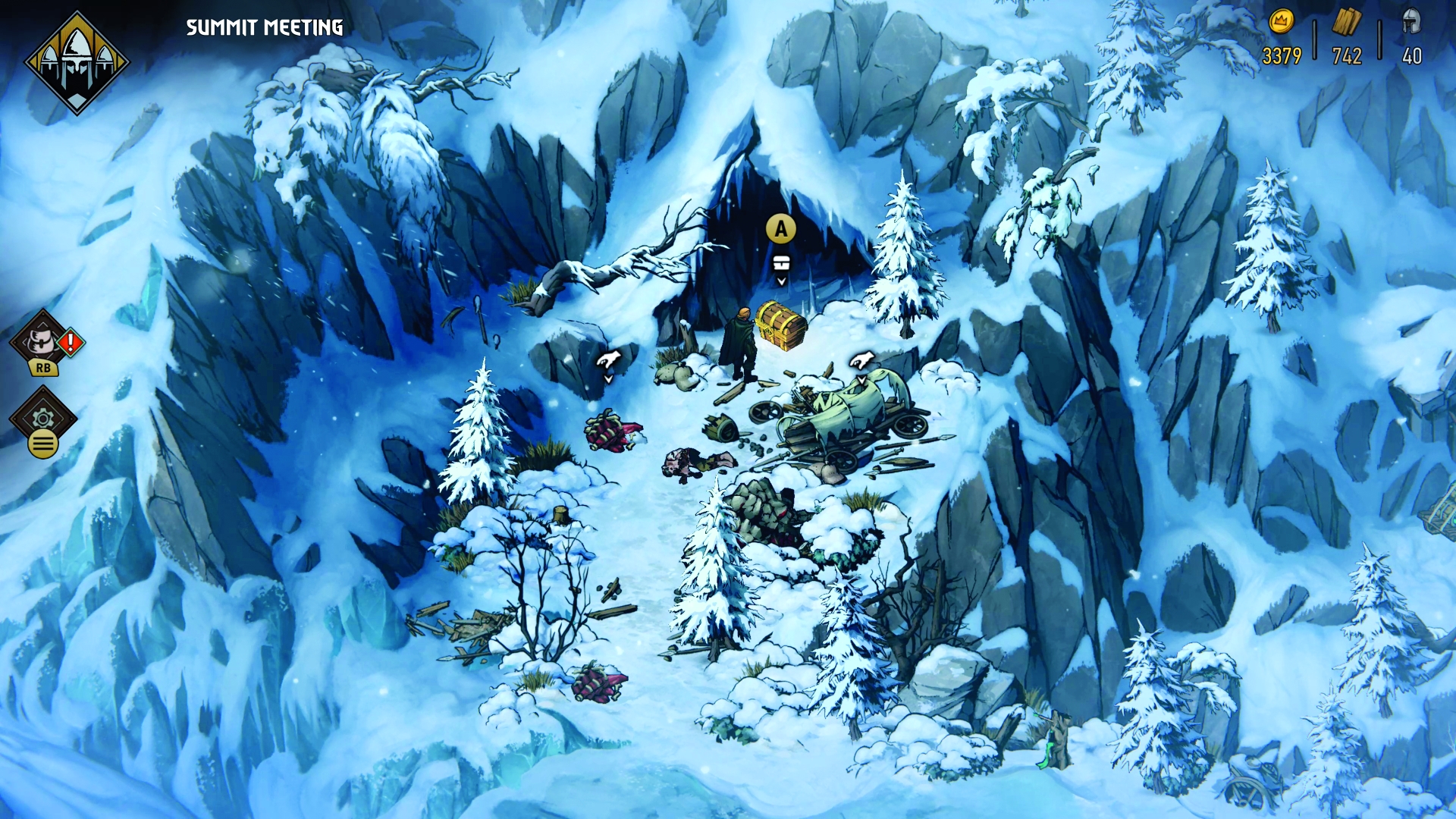
If you've played plenty of Gwent in The Witcher 3, then you've got a good sense of how Thronebreaker's matches play out: turn-based, one-on-one battles of wits, where rounds are won by whoever has the highest combined power of all the units on their side. But Gwent's undergone some substantial changes since you saw it last. The three-lane layout on each side of the board has been reduced to two rows in Thronebreaker, making it much easier to grasp the 'melee vs. ranged' dynamics (and better appreciate the cards themselves). You've also got a leader ability that you can use on a cooldown (with different effects depending on the weapon you've equipped Meve with), and a set of trinkets that act like powerful spells and always start in your opening hand.
Heart of the cards
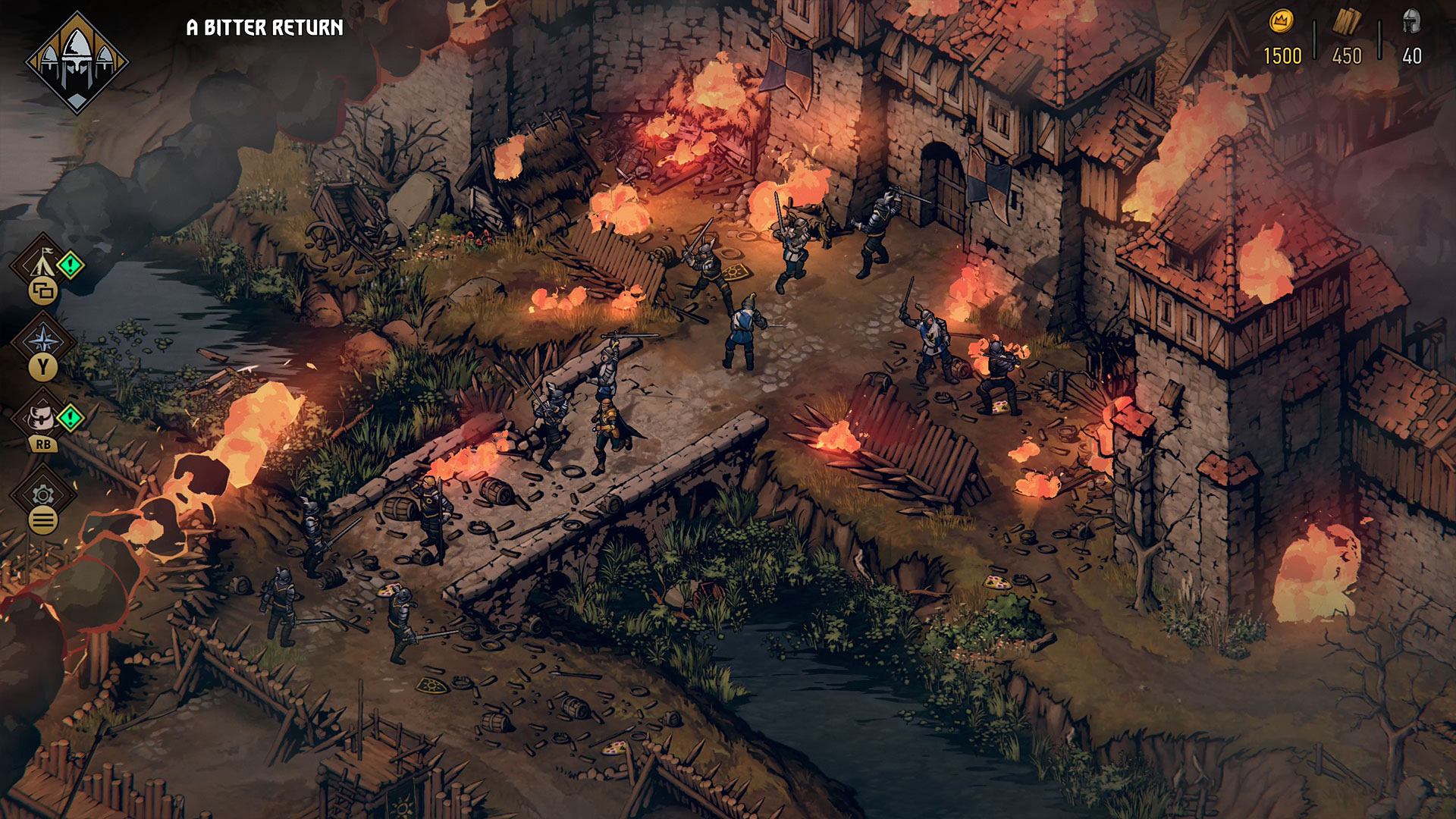
Having dabbled in the multiplayer version of Gwent, I'm of the mind that it's much more enjoyable in a single-player setting like Thronebreaker. Unlike Hearthstone, where a lot of the strategy boils down to making minions hit each other in advantageous ways, Thronebreaker's card battles are decided by macro-level planning and an eventual sense of inevitability, as most cards don't actively do anything by themselves after they've entered play. Instead of drawing through your deck and needing to react to your opponent's every move, you're more focused on simply sticking to the plan set forth by your opening hand while trying to sabotage the enemy's efforts at key moments. Normal matches are best-of-three, but the first round can often decide the whole shebang as you play out your best combos to ensure an early victory (I often find myself internally quoting Ethan Hawke in Gattaca when he shouts "I never saved anything for the swim back!").
That kind of 'I've definitely got this' mentality can be miserable for the losing player when two humans go head-to-head - but it's extremely satisfying when you're beating the snot out of an AI monster or bandit. In the immortal words of The A-Team's Hannibal, I love it when a plan comes together. To help keep things nice and varied, Thronebreaker also works in a bevy of optional puzzles between the standard battles, all of which are brilliantly designed and never repeat the same trick twice. It always feels amazing to finally crack the solution of a particularly tough brain teaser, and I was ever eager to see what kinds of special cards and unique win conditions the next puzzle would serve up.
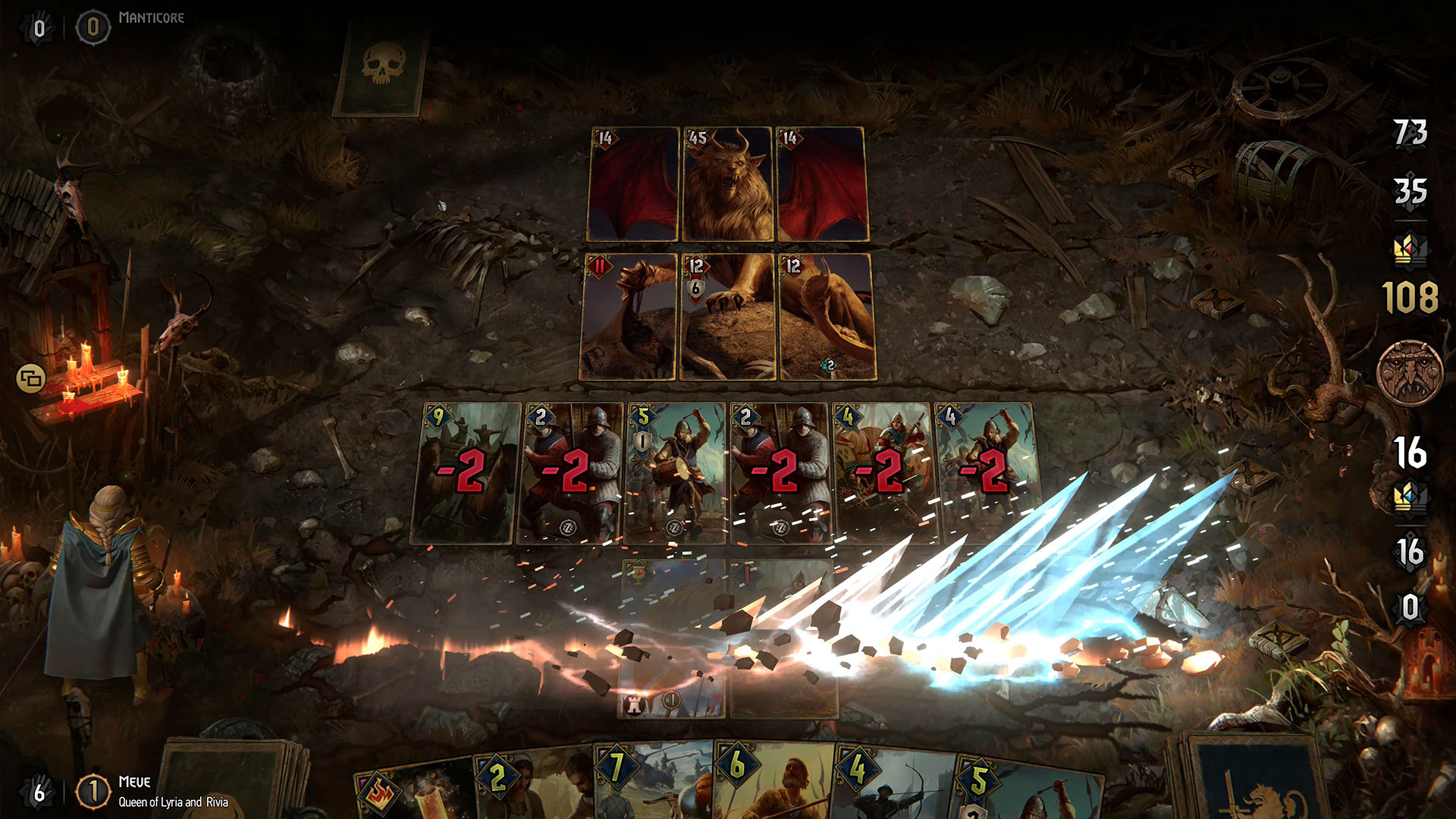
The cards themselves, like all the other aspects of Thronebreaker's presentation, are wonderful. All are adorned with colorful, evocative artwork, and many are animated into such lively, captivating scenes that, when paired with feels-like-you're-there sound effects, simply put Hearthstone's golden cards to shame. The collection is rife with delightful signature phrases when a card enters play that only get better with time (a personal favorite of mine: "Got any vittles? Hungry like a wolf I am"). There are many more small details that make Thronebreaker's aesthetic shine, from the way characters subtly sway and breathe during cutscenes (as opposed to the static cutouts of a visual novel), to the points of interest that dot every environment, and even the synced-up mouth movements during dialogue. It's all so wonderful that I can easily forgive the minor moments that made my inner editor cry out, like when a typo would crop up, or there was an errant extra space, or the spoken lines didn't perfectly match up with the subtitles.
It's as if the folks at CD Projekt Red weaponized a game to specifically target my interests, despite the fact that I've not spent a single minute playing as Geralt. Thronebreaker calls to mind the supreme polish of Hearthstone; Diablo 2's rich isometric worlds; ethereal writing a la inkle's 80 Days; upgrading my base camp in Darkest Dungeon; the hard choices and heartbreak of Telltale's The Walking Dead. I've done my best to avoid any spoilers for Thronebreaker's story and surprise puzzle elements for this review, because you deserve to experience them for yourself. Thronebreaker isn't just a great spinoff of The Witcher, or just an excellent card game - it's a spectacularly crafted RPG that'll delight anyone who loves a good story wonderfully told.
Reviewed on PC; coming to PS4 and Xbox One on December 4, 2018.
Lucas Sullivan is the former US Managing Editor of GamesRadar+. Lucas spent seven years working for GR, starting as an Associate Editor in 2012 before climbing the ranks. He left us in 2019 to pursue a career path on the other side of the fence, joining 2K Games as a Global Content Manager. Lucas doesn't get to write about games like Borderlands and Mafia anymore, but he does get to help make and market them.

